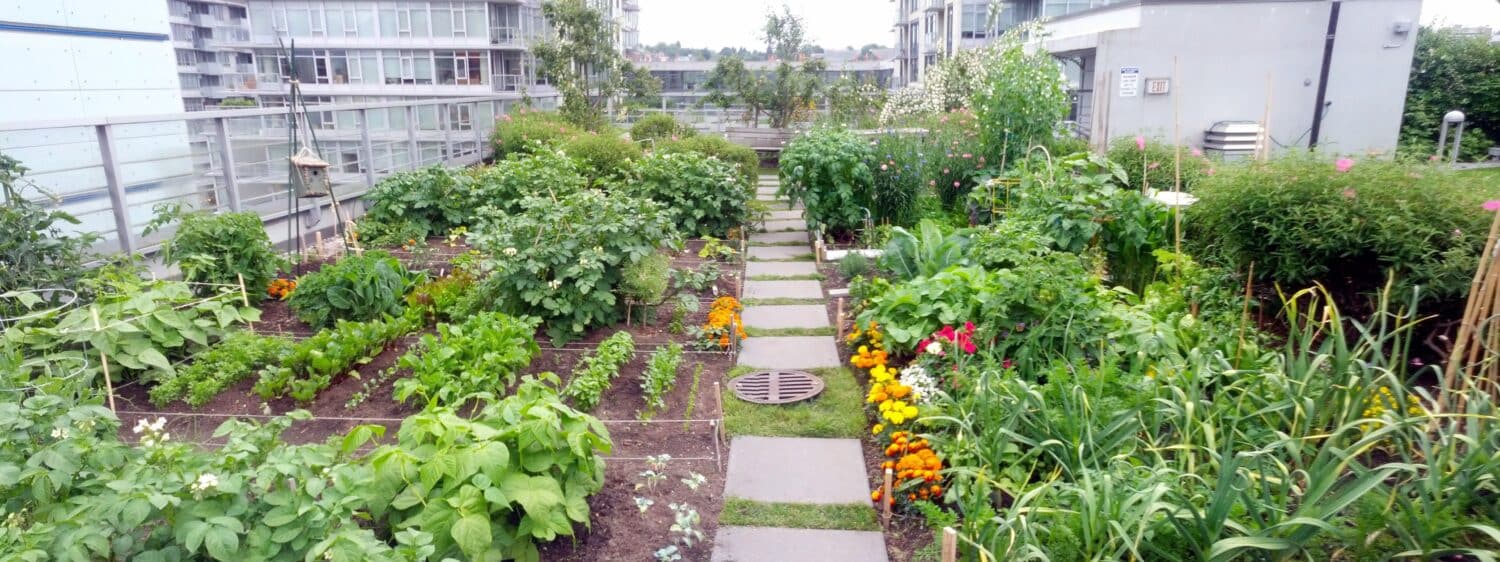New frontiers
The urban agriculture movement sweeping North American cities has lessons for the UK, argues Leanne Werner
In the midst of extreme global environmental challenges and growing concerns over food security, urban agriculture is emerging as a transformative force reshaping the fabric of our cities and our relationship with food. This movement, which advocates for growing food in urban areas, not only promises to enhance local sustainability but also tackles critical issues such as biodiversity loss, climate change, and community wellbeing.
The urgent need for change is self-evident. Conventional agricultural practices, reliant on chemical inputs and monocultures, have strained rural ecosystems, leading to depleted soils and biodiversity loss. Recent reports by the Intergovernmental Panel on Climate Change (IPCC) highlight that a global temperature rise above 1.5°C poses severe risks to food security and ecological stability, necessitating immediate action. To make matters worse, the United Kingdom, like many nations, heavily relies on imports for fresh produce, leaving us vulnerable to climate-related disruptions in the global food supply chain.
Urban agriculture offers a promising alternative. By cultivating food within city limits, communities can reduce their carbon footprint associated with ‘food miles’ while simultaneously alleviating pressure on rural landscapes.
The environmental benefits of urban agriculture are multifaceted. Local food production enhances biodiversity, improves air and water quality, mitigates floods, and fosters ecological resilience. Furthermore, shifting towards locally-grown produce promotes healthier dietary choices, contributing to positive public health outcomes and reducing the burden on healthcare systems.
After eight weeks of travelling across North America looking at initiatives exploring urban agriculture, I became convinced of its potential. The pioneering efforts of North American cities provide valuable insights for urban centres like London facing similar challenges. Cities like Toronto, Montreal, Detroit, Vancouver, and Portland are at the vanguard of urban agriculture, and have implemented innovative policies such as mandatory green roofs, expansive rooftop farms, and inclusive ‘agrihoods’ to integrate agriculture into urban planning. My report, published in May, explores these initiatives and looks at what we could learn.
Urban agriculture in the US and Canada
Toronto’s bylaw, mandating green roofs for new buildings, stands out as a trailblazing policy. Introduced in 2009, this bylaw requires buildings over 2000 square meters to include green sections on their roofs or pay a fee. This initiative not only enhances energy efficiency but also supports urban biodiversity.
Detroit’s Land Based Project Team exemplifies how cities can empower residents to engage in urban agriculture. By providing clear guidelines on land use and facilitating land purchase for agricultural purposes, Detroit encourages community involvement in food production while addressing land use challenges.
Vancouver’s Greenest City Action Plan demonstrates a comprehensive approach to sustainable urban agriculture. Initiatives include the creation of a Food Policy Council, integration of agriculture into urban planning, adoption of local food procurement policies, and incentives for urban farming. These strategies foster local food production, reduce environmental impact, and promote community resilience.
Unlocking urban spaces for food production
In densely populated cities where space is at a premium, the quest for land to grow food often seems daunting amid competing demands for housing and infrastructure. However, innovative approaches in North American cities demonstrate that with creativity, persistence, and community support, there are numerous untapped spaces suitable for urban agriculture.
From gardens, balconies, and rooftops to unconventional locations like schools, libraries, and vacant lots, the potential for urban food production is boundless. Consider these inspiring examples:
Toronto Metropolitan University: Leveraging Toronto’s green roof bylaw, the university hosts two rooftop farms producing over 2,500kg of food annually. These initiatives not only provide fresh produce but also drive research into sustainable farming practices.
AU/LAB, Montreal: Led by environmental scientist Eric Duchemin, AU/LAB promotes urban agriculture initiatives geared towards creating a fully sustainable food system and a circular economy. It collaborates with other organizations to drive innovation in urban agriculture.
Fresh Roots, Vancouver: This organization pioneers urban farms in schools, integrating food production into education. Through hands-on learning programs, Fresh Roots engages over 5,000 students annually in growing healthy food.
Depave, Portland: By removing unnecessary pavement, Depave creates space for community gardens and green areas. Public events engage residents in reimagining urban spaces.
Urban farming boosts biodiversity
Urban farming, when practiced mindfully, contributes significantly to biodiversity in urban environments. Research indicates that plant diversity in urban agricultural sites surpasses that of conventional green spaces, fostering increased pollinator populations crucial for enhancing food production.
FoodShare’s Burmhampton High School: This three-acre site exemplifies how urban farming can nurture biodiversity. With dedicated areas for food production, pollinators, and an orchard, the site has become a thriving ecosystem supporting hundreds of pollinators. Organic farming practices, including crop diversity and natural pest control, promote biodiversity and soil health.
Farmers on 57th, Vancouver: Located at the George Pearson Centre, this urban farming initiative empowers residents, many in wheelchairs, to reconnect with gardening. Organic farming methods and accessible raised beds not only yield vegetables and herbs but also provide therapeutic benefits to residents. Through initiatives like the Community Supported Agriculture (CSA) program, Farmers on 57th promotes local food connections and biodiversity.
Food sovereignty through urban farming
The concept of food sovereignty, defined at the Forum for Food Sovereignty in Nyéléni, Mali, in 2007, asserts peoples’ rights to culturally-appropriate, ecologically sound food produced sustainably. La Vía Campesinachampions this framework, emphasizing the importance of inclusive urban farming practices that honour cultural diversity.
Black and Indigenous Food Sovereignty at Toronto Metropolitan University: The university’s rooftop farm hosts the Black Food Sovereignty Alliance Program, led by Nicole Austen, promoting community-supported agriculture. The initiative focuses on growing culturally significant crops and emphasizes food literacy, social justice, environmental stewardship, and community healing.
Equitable Food Distribution: Toronto Metropolitan University’s rooftop farm, producing 2,500kg of food annually, ensures equitable distribution. A third of the produce is donated to organizations serving vulnerable communities, a third is sold at subsidized rates to students, and a third is sold at market rates.
As climate disasters intensify, with wildfires and floods displacing entire populations, the imperative to embrace sustainable practices like urban agriculture is becoming ever more pressing. While it may not offer a singular solution to the climate crisis, urban agriculture represents a critical component of a holistic approach towards building resilient, equitable, and sustainable cities.
Ultimately, the success of urban agriculture hinges on collaborative efforts, innovative policies, and community engagement. By nurturing urban ecosystems of agriculture, cities can forge a path towards a more food-secure and harmonious future, reconnecting residents with nature and fostering a sense of collective stewardship over our environment and well-being.
Image credit: Christopher Porter via Flickr
Image credit (pinned, News & Insight): Markus Spiske via Unsplash

